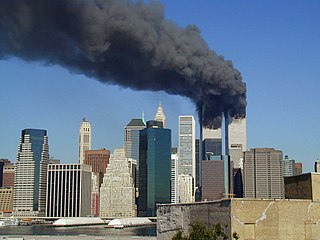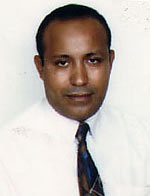
Al-Qaeda is a pan-Islamist militant organization led by Sunni jihadists who self-identify as a vanguard spearheading a global Islamist revolution to unite the Muslim world under a supra-national Islamic caliphate. Its membership is mostly composed of Arabs but also includes people from other ethnic groups. Al-Qaeda has mounted attacks on civilian, economic and military targets of the U.S. and its allies; such as the 1998 US embassy bombings, the USS Cole bombing, and the September 11 attacks.
The Benevolence International Foundation, was a purported nonprofit charitable trust based in Saudi Arabia. It was determined to be a front for terrorist group Al-Qaeda and was banned by the United Nations Security Council Committee 1267 and the US Department of the Treasury in November 2002. The BIF's chief executive officer Enaam Arnaout began a ten-year sentence in 2003 after pleading guilty for racketeering in a U.S. federal court.

Al-Haramain Islamic Foundation (AHIF) was a charity foundation, based in Saudi Arabia. Under various names it had branches in Afghanistan, Albania, Bangladesh, Bosnia, Comoros, Ethiopia, India, Kenya, Malaysia, the Netherlands, Nigeria, Pakistan, Somalia, Tanzania, and the United States, and "at its height" raised between $40 and $50 million a year in contributions worldwide. While most of the foundation's funds went to feed poor Muslims around the world, a small percentage went to Al-Qaeda, and that money was "a major source of funds" for the terrorist group. In 2003, Saudi authorities ordered Al-Haramain to shut down all overseas branches, and by 2004 Saudi authorities had dissolved Al-Haramain. However, US intelligence officials believed it had reopened branches under new names.

United Nations Security Council Resolution 1373, adopted unanimously on 28 September 2001, is a counterterrorism measure passed following the 11 September terrorist attacks on the United States. The resolution was adopted under Chapter VII of the United Nations Charter, and is therefore binding on all UN member states.

United Nations Security Council resolution 1566, adopted unanimously on 8 October 2004, after reaffirming resolutions 1267 (1999), 1373 (2001) and 1540 (2004), the Council condemned terrorism as a serious threat to peace and strengthened anti-terrorism legislation.

United Nations Security Council resolution 1267 was adopted unanimously on 15 October 1999. After recalling resolutions 1189 (1998), 1193 (1998) and 1214 (1998) on the situation in Afghanistan, the Council designated Osama bin Laden and associates as terrorists and established a sanctions regime to cover individuals and entities associated with Al-Qaida, Osama bin Laden and/or the Taliban wherever located.
The ISIL (Da'esh) and Al-Qaida Sanctions Committee is a committee of the United Nations Security Council tasked with implementing international sanctions against the Islamic State and al-Qaeda. It was established as the Al-Qaida and Taliban Sanctions Committee on 15 October 1999, pursuant to Security Council Resolution 1267, which designated al-Qaeda and the Taliban as terrorist organizations. Following the creation of a separate Taliban Sanctions Committee on 17 June 2011, it was renamed the Al-Qaida Sanctions Committee. The scope of the sanctions regime was expanded to include the Islamic State on 17 December 2015 pursuant to Resolution 2253.

Ali Sayyid Muhamed Mustafa al-Bakri alias Abd al-Aziz al-Masri is an Egyptian member of the Shura Council of the terrorist organization al-Qaeda and a former member of Egyptian Islamic Jihad, from which he migrated to al-Qaeda, along with Ayman al-Zawahiri. Al-Bakri is at large, and the United States Department of State is offering up to US$5 million for information about his location. The State Department wanted poster reads:
Ali Sayyid Muhamed Mustafa al-Bakri is an al-Qaida member and an explosives and chemical weapons expert. He is a member of the al-Qaida Shura council and is a close associate of al-Qaida leaders Saif al-Adel and Ayman al-Zawahiri. Prior to joining al-Qaida, al-Bakri was a member of the Egyptian Islamic Jihad terrorist group, under the direction of Ayman al-Zawahiri. He served as an instructor in al-Qaida's camps in Afghanistan, providing terrorist recruits with training in the use of explosives and chemical weapons. Al-Bakri also unsuccessfully attempted to hijack a Pakistani Air passenger flight in December 2000. It is likely that he continues to train al-Qaida terrorists and other extremists.

Yassin Abdullah Kadi is a Saudi Arabian businessman. A multi-millionaire from Jeddah, Kadi trained as an architect in Chicago, Illinois. He is the son-in-law of Sheikh Ahmed Salah Jamjoom, a former Saudi Arabian government minister with close ties to the Saudi royal family.
United Nations Security Council Resolution 1904, adopted unanimously on 17 December 2009, after reiterating its "unequivocal condemnation" of Osama bin Laden, the Taliban and Al-Qaeda for "ongoing and multiple criminal terrorist acts", the Council adopted new measures to its decade-old regime of sanctions on the groups and others associated with them. The decision to adopt new measures originated from questions arising since Resolution 1267 (1999) and subsequent resolutions which imposed travel restrictions, asset freezes and an arms embargo on Osama bin Laden, the Taliban, Al-Qaeda and other associated groups which were placed on a "Consolidated List" compiled by the Security Council Committee established by Resolution 1267.
Mullah Abdul Samad Khaksar, also referred to as Mohammad Khaksar, served as Minister or Deputy Minister of Interior for Afghanistan under the Taliban government.
United Nations Security Council resolution 1390, adopted unanimously on 16 January 2002, after recalling resolutions 1267 (1999), 1333 (2000), 1363 (2001), 1368 (2001), 1373 (2001) 1378 (2001) and 1383 (2001) concerning the situation in Afghanistan and terrorism, the Council imposed further sanctions on Osama bin Laden, Al-Qaeda, the Taliban and others associated with them.

United Nations Security Council resolution 1452, adopted unanimously on 20 December 2002, after recalling resolutions 1267 (1999), 1333 (2000), 1363 (2001), 1368 (2001) and 1390 (2001) concerning Al-Qaeda, the Taliban and terrorism, the Council decided that financial sanctions against the organisations would not apply to expenses for food, rent, medicine and medical care, health insurance and professional fees.

United Nations Security Council resolution 1455, adopted unanimously on 17 January 2003, after recalling resolutions 1267 (1999), 1333 (2000), 1363 (2001), 1373 (2001), 1390 (2001) and 1452 (2002) concerning Al-Qaeda, the Taliban and terrorism, the council improved the implementation of measures against the groups. It was the first Security Council resolution adopted in 2003.
United Nations Security Council resolution 1526, adopted unanimously on 30 January 2004, after recalling resolutions 1267 (1999), 1333 (2000), 1363 (2001), 1373 (2001), 1390 (2001), 1452 (2002) and 1455 (2003) concerning terrorism, the council tightened sanctions against Al-Qaeda, the Taliban, Osama bin Laden and associated individuals and groups.

United Nations Security Council Resolution 1988, adopted unanimously on June 17, 2011, after recalling resolutions 1267 (1999), 1333 (2000), 1363 (2001), 1373 (2001), 1390 (2002), 1452 (2002), 1455 (2003), 1526 (2004), 1566 (2004), 1617 (2005), 1624 (2005), 1699 (2006), 1730 (2006), 1735 (2006), 1822 (2008) and 1904 (2009) on terrorism and the threat to Afghanistan, the Council imposed separate sanctions regimes on Al-Qaeda and the Taliban.

United Nations Security Council Resolution 1989, adopted unanimously on June 17, 2011, after recalling resolutions 1267 (1999), 1333 (2000), 1363 (2001), 1373 (2001), 1390 (2002), 1452 (2002), 1455 (2003), 1526 (2004), 1566 (2004), 1617 (2005), 1624 (2005), 1699 (2006), 1730 (2006), 1735 (2006), 1822 (2008), 1904 (2009) and 1988 (2011) on terrorism and the threat to Afghanistan, the Council imposed separate sanctions regimes on Al-Qaeda and the Taliban.

United Nations Security Council Resolution 1735, adopted unanimously on December 22, 2006, after recalling resolutions 1267 (1999), 1333 (2000), 1363 (2001), 1373 (2001), 1390 (2001), 1452 (2002), 1455 (2003), 1526 (2004), 1566 (2004), 1617 (2005), 1624 (2005) and 1699 (2005) on terrorism, the Council approved measures to improve the identification and control of terrorists.
Terrorism in the United Arab Emirates describes the terrorist attacks in the United Arab Emirates, as well as steps taken by the Emirati government to counter the threat of terrorism. Although terrorist attacks are rare, the UAE has been listed as a place used by investors to raise funds to support militants in Afghanistan, Pakistan, and the financing of the September 11 attacks. Businesses based in the UAE have been implicated in the funding of the Taliban and the Haqqani network. In the 72nd session of the UN General assembly in New York, UAE foreign minister Abdullah bin Zayed Al Nahyan affirmed the United Arab Emirates policy of zero tolerance towards terrorism financing.

International sanctions against Afghanistan were implemented by the United Nations in November 1999. The sanctions were initially aimed at terrorists, Osama bin Laden and members of Al-Qaeda. The United States, the United Kingdom and the European Union also impose sanctions on Afghanistan.











